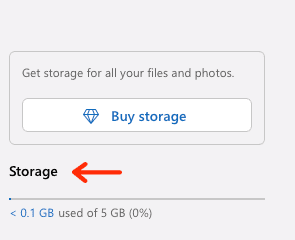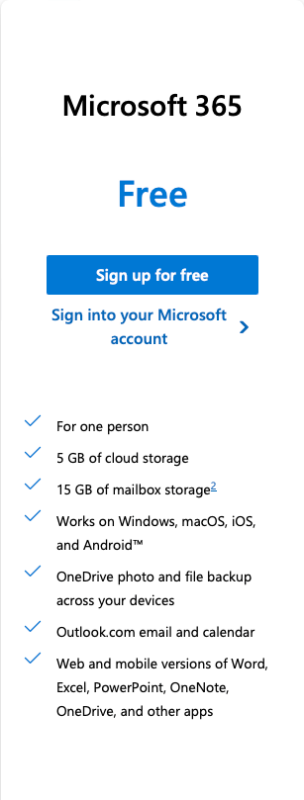OneDrive Feature Overview
In this lesson, we will examine OneDrive at a high level and provide an overview of its features for both personal and business plans.
What Is OneDrive?
Microsoft OneDrive is a file-hosting service, which is another way of saying that it is a cloud storage provider.
A simpler explanation is that OneDrive stores the files that you upload from your account to its servers. You can share your OneDrive files with others, and any changes you make to your files will sync with your account.
How Does OneDrive Work?
OneDrive cloud storage has many of the same cloud features as other providers, which include file sync, file sharing and collaboration capabilities.
File Sync
OneDrive stores your digital data on its servers and gives you access to them through your registered account. When you create or upload files and folders from your connected devices, the changes reflect in your account through file synchronization.
File sync ensures that the most up-to-date version of the file is available to you, no matter which device you use to access your account. OneDrive has downloadable desktop apps for Mac and Windows and mobile versions for Android and iOS.
The desktop and mobile apps are extensions of your account, with many features are available for both. One example is the sync folder in the desktop app, which you can use to add or remove folders and files. The mobile app has image functionality, helping free up storage space and ensuring you don’t lose your pictures.
File Sharing
Another main feature of OneDrive is file sharing. File sharing lets you choose any file or folder in your account and share it with someone else.
You can share a folder or files with others, whether they have a OneDrive account or not. However, whether the recipient (or recipients) has a OneDrive account will determine how you share items with them. You can invite them directly via an email address or by creating a shareable link that you can send.
Microsoft 365 Collaboration
Additionally, OneDrive is a good collaboration tool, especially when using apps in the Microsoft ecosystem. A OneDrive account does more than just give you access to cloud storage — you also get access to the most popular Microsoft 365 apps, like Word, Excel and PowerPoint. Creating a OneDrive account also includes access to Outlook, Microsoft’s email app.
If you use Microsoft 365, especially the web version of the corresponding apps, OneDrive acts as the storage backend for your data.
OneDrive Features Overview
In addition to the core Microsoft 365 apps and basic functionality like sharing and sync, OneDrive offers features for both free and paid plans. It integrates with Microsoft SharePoint and Teams, letting you store and share data within those apps. Additionally, you can access your OneDrive account with desktop apps for Mac and PC or mobile apps for iOS and Android.
OneDrive has a few advanced features, such as expiration dates and passwords for shared links, computer backup features and mobile document scanning. Different features are available on different plans. The following table summarizes OneDrive’s features for personal plans.
OneDrive Personal Plan Features
| Free | Microsoft 365 Basic | Microsoft 365 Personal | Microsoft 365 Family | |
| Storage | 5GB for one user | 100GB for one user | 1TB for one user | Up to 6TB, 1TB per user |
| Desktop Versions of Word, Excel, PowerPoint and Outlook | ||||
| Web Versions of Word, Excel, PowerPoint and Outlook | ||||
| Expiration Dates for Shared Links | ||||
| Password Protection for Shared Links | ||||
| Mobile Offline Folder Access | ||||
| PC Folder Backup | ||||
| Version History | 25 versions | 30 days | 30 days | 30 days |
| File Size Limit | 250GB | 250GB | 250GB | 250GB |
OneDrive Business Plans Features
OneDrive business plans have additional features designed to support professionals and teams, which are outlined in the table below.
| OneDrive for Business | Microsoft 365 Business Basic | Microsoft 365 Business Standard | Microsoft 365 Business Premium | |
|---|---|---|---|---|
| Total Storage | 1TB per user | 1TB per user | 1TB per user | 1TB per user |
| Block Download of Shared Files | ||||
| Edit Files or PDFs on Desktop or Mobile Apps | ||||
| Collaborate on Files | ||||
| File Audit and Reporting | ||||
| Data Retention Policies | ||||
| Web Versions of Outlook, Word, Excel, PowerPoint and OneNote | ||||
| Desktop Versions of Outlook, Word, Excel, PowerPoint and OneNote | ||||
| Microsoft Teams | ||||
| Advanced Cyberattack Protection | ||||
| Device Management | ||||
| Copilot AI |
Microsoft also offers a new AI-powered tool called Copilot. This feature comes at an additional cost to paid plans for individuals, families, businesses and enterprises. With Copilot, you can use AI to help create documents, set up meetings and edit presentations.
Storage Space
Storage space determines how much data you can keep in your account. It is the one factor that can limit what you can do and how you can use your cloud storage. If you have many photos or other file types that take up a lot of space, you could quickly run out of storage capacity.
How much storage space you get with a given plan is often the most important consideration for personal and business customers. If you don’t have enough storage space to do what you need, then your account isn’t worth much.
Most cloud storage services offer different storage tiers, ranging from low-cost, limited storage to more expensive and expansive storage capacity.
How Much Storage Space Do I Have on OneDrive?
You can always see how much storage you have when you are logged in to your account. In the lower left corner of the “account” page on the web interface, as seen in Figure 1.1, OneDrive displays your total storage capacity and how much you’ve used.

The plan you choose directly impacts the amount of storage capacity you have. With an individual personal plan, the most storage you can get is 1TB. The family plan allots up to 6TB of storage, with 1TB of storage allocated to each family member. For example, if there are three people on a family plan, the account will provide a total of 3TB of storage space.
OneDrive Free Storage
OneDrive offers 5GB of free storage for one individual. However, a free OneDrive account entails more than just cloud storage, as it also includes a Microsoft account. Other features include 15GB of mailbox storage, downloadable apps and access to Outlook. Figure 1.2 highlights everything that comes with a free account.

OneDrive File Size Limits
OneDrive lets you upload, download and transfer files up to 250GB. This limit is per file, not in total. If you need to transfer large files, you can use the desktop app instead of uploading on the web for a faster experience.
OneDrive Course
Register Now and Get a 52% Discount